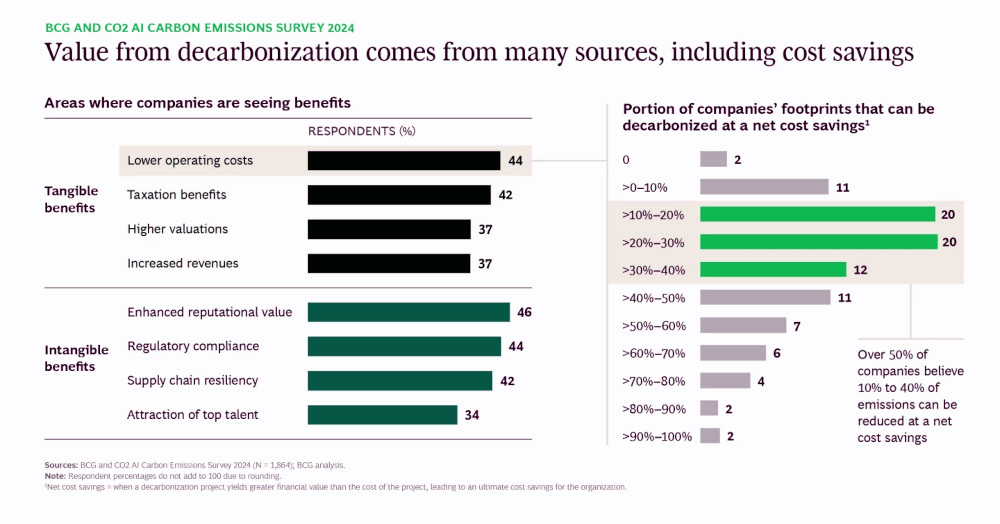Despite the escalating climate crisis and 2023 marking the hottest year on
record, corporate progress on decarbonization has slowed around the world. A new
study released Tuesday by Boston Consulting Group
(BCG) and CO2 AI reveals that companies have made
minimal progress on climate issues over the past year — yet, those at the
forefront report substantial financial benefits from decarbonization.
The fourth edition of the companies’ fourth annual Carbon Emissions Survey —
detailed in the report, Boosting Your Bottom Line Through
Decarbonization
— polled 1,864 executives overseeing their company’s emissions measurement,
reporting and reduction initiatives. The respondents represent 16 major
industries across 26 countries, and collectively are responsible for
approximately 45 percent of global greenhouse gas emissions. Each organization
has at least 1,000 employees and annual revenues ranging from $100 million to
more than $20 billion.
Climate progress stalls
The survey builds on BCG and CO2 AI’s
2021,
2022
and
2023
investigations into the progress that companies have made on emissions
management and reduction, and the actions they are taking to decelerate climate
change. Among the nearly 2,000 companies surveyed in 2024, only 9 percent
described comprehensive reporting of Scopes 1, 2 and 3 emissions. Just 16
percent have set targets across all three scopes; and only 11 percent have
achieved emissions reductions in line with their ambitions. These figures are
all lower than those reported by companies in 2023.
Substantial financial benefits from decarbonization
Nonetheless, there are bright spots. Companies in Brazil, China and
India are leading the way in comprehensive emissions reporting, target
setting, and achieving emissions reductions in line with their goals.
And even as overall progress has seemed to slow, 25 percent of the businesses
surveyed reported annual decarbonization benefits equal to more than 7 percent
of their revenues for an average net benefit of $200 million a year. One of the
leading benefits was a reduction in operating costs — often resulting from
initiatives that boost efficiency, waste reduction, the rationalization of
materials or footprints, or the use of renewable energy.

Cost-neutral decarbonization
More than half of the companies surveyed reported that they believe their
emissions can be reduced by 10-40 percent, at a net cost savings. Consumer goods
giant Reckitt did so through product innovation: One initiative cut scope 3
emissions
associated with the company’s Air Wick brand by reducing emissions in
transportation, manufacturing and the raw materials used to create the
fragrances. As David Croft,
Reckitt’s group head of sustainability, asserts in the report: “Our sustainable
product innovation process gives us the opportunity to enable decarbonization at
scale and focus on the areas where we can make the most impact on carbon.”
“This year's survey highlights the substantial rewards some companies are
reaping from decarbonization — including significant financial gains, enhanced
reputations and operational efficiencies,” said Hubertus
Meinecke, BCG’s global leader
of climate and sustainability and a coauthor of the study.
Decarbonization efforts that reduce operating costs build on a similar win-win
of climate action highlighted in another recent study — which found that
companies proactively working to reduce their carbon footprint and transparently
share their environmental strategies and data also benefit from lower
costs of capital,
by increasing investor trust.
Steps to unlocking value
The report highlights three foundational actions as the initial steps in a
company’s decarbonization journey; optimizing them often leads to
decarbonization excellence and significant value capture:
-
Measurement — Companies measuring all three scopes comprehensively are
1.6 times more likely to experience significant decarbonization benefits.
-
Reporting — Companies fully reporting each scope are 1.5 times more
likely to experience significant decarbonization benefits.
-
Target setting — Companies setting validated targets for each
scope
are 1.9 times more likely to experience significant decarbonization
benefits.
Beyond foundational steps, companies can increase emissions reductions and
potential rewards through advanced actions. The survey suggests several
tech-enabled actions that boost accuracy, impact and value capture:
-
AI usage. Companies using AI to reduce emissions — in ways that account
for the technology’s own
impacts
— are 4.5 times more likely to see significant decarbonization benefits.
-
Product-level emissions. Companies that calculate product-level
emissions
are four times more likely to experience significant decarbonization
benefits.
-
Climate transition plans. Companies that adopt a climate transition
plan
are 2.9 times more likely to experience significant decarbonization benefits
and 3.3 times more likely to reduce emissions in accordance with a 1.5°C
pathway.
Read the full report
here.
Get the latest insights, trends, and innovations to help position yourself at the forefront of sustainable business leadership—delivered straight to your inbox.
Sustainable Brands Staff
Published Sep 18, 2024 2pm EDT / 11am PDT / 7pm BST / 8pm CEST